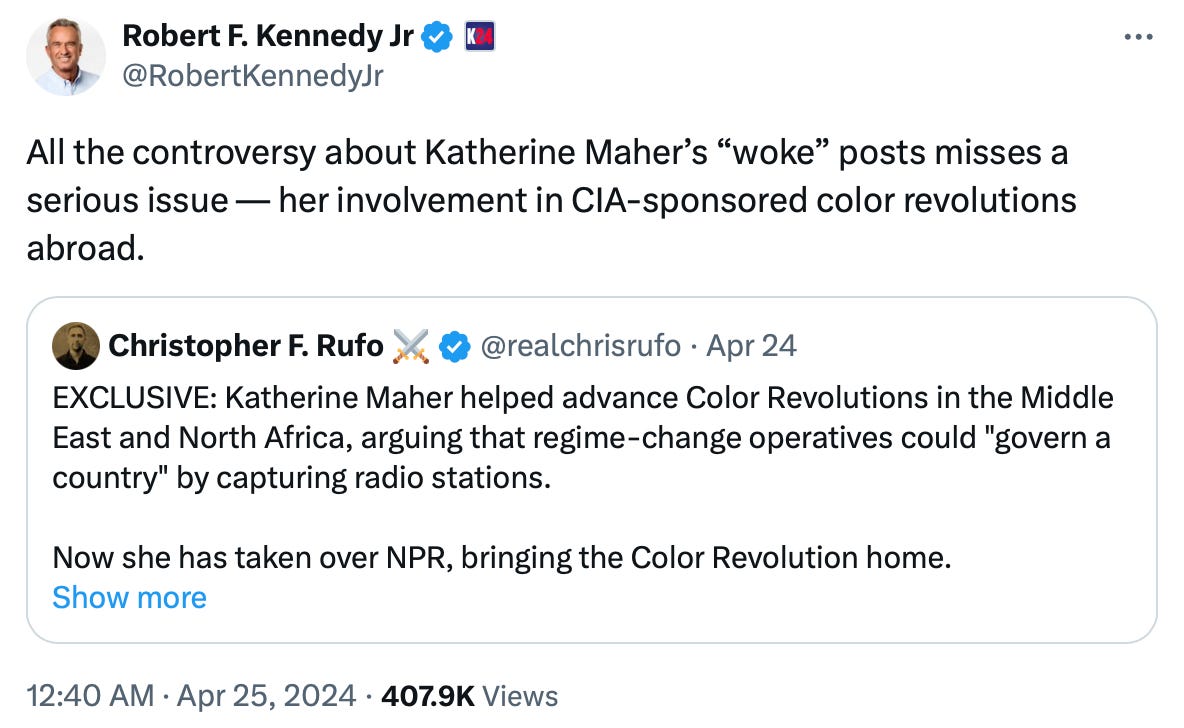
Honest Media recently explored the proposition that NPR’s CEO Katherine Maher is an intelligence asset. Maher’s resume, replete with its extensive ties to the American foreign service and intelligence agencies, invites logical line of inquiry. After our initial post, Christopher Rufo reported in City Journal that Maher has also helped lead Color Revolutions.
As NPR’s new leader, Maher’s experience and views do matter since they will shape the delivery of news to a key demographic of the American population. NPR is increasingly aligned with establishment Democrats, but still quite influential in the American media landscape.
Presidential candidate Robert F. Kennedy Jr. responded on X to Rufo’s revelations, stating, “All the controversy about Maher’s “woke” posts misses a serious issue – her involvement in CIA-sponsored color revolutions abroad.” Kennedy went on to underscore the key takeaway of Rufo’s findings, saying, “I don't know if she is actual CIA, or just ideologically aligned. What is clear though is that she will assiduously advance establishment narratives.”
Kennedy’s reference to Maher’s “woke” posts harkens back to Matt Taibbi’s reporting in Racket News. Taibbi explored some of Maher’s more unhinged posts on X over a period of several years. While Maher’s use of bizarre, and often unhinged, language might be amusing to analyze, Kennedy writes, her involvement in the CIA practice of regime change should be of grave concern to all Americans given her present influential position in media.
As Rufo writes,
The ostensible purpose of Color Revolutions—named after the Rose Revolution, Orange Revolution, and Tulip Revolution in Georgia, Ukraine, and Kyrgyzstan, respectively—is to replace authoritarian regimes with Western liberal democracies. American and European intelligence services are often heavily involved in these revolutions, with ambitions not only to spread modern ideologies but also to undermine geopolitical opponents.
Rufo goes on to explain how the objective of regime change is achieved. By supporting student movements and domestic unrest, the CIA helps foment chaos before stepping in to fill the void by manipulating public opinion to align with its desired outcome. The agency employs sophisticated techniques that disseminate information to the public in a way that convinces people to support the CIA’s desired end – without, of course, promoting that end as a CIA objective. Rufo argues that Maher has made use of these techniques, which she learned as a foreign service officer, to manipulate public opinion in the United States as CEO of both NPR and the Wikimedia Foundation, which she previously led.
Indeed, Maher arrived at NPR already skilled in overseeing censorship under the guise of fighting “disinformation” at Wikimedia. This foundation controls Wikipedia, the so-called neutral online encyclopedia that millions of people consult every day for credible information. Needless to say, the subtle incorporation of establishment bias in both these platforms can exercise enormous influence in shaping mass opinion.
Notably, Maher’s ties to the Democratic Party and her admitted establishment bias – laid bare in Uri Berliner’s recent and highly publicized critique – reflect the authoritarian direction that the Wikimedia Foundation and NPR have taken. But Maher’s ideological spin is less concerning than the means she uses to exercise it. As Rufo reports, Maher has previously written about controlling the airwaves as a way to “Govern a Country.”
Whether or not Maher is a Deep State plant, she is using NPR to advance an agenda that fits her worldview and that of her ideological allies. Thanks to Berliner’s principled critique of NPR’s “woke” drift, which led to his unfortunate dismissal, Maher and her team are now on defense and show no inclination to change course.




